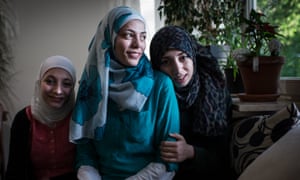
When Ruaa Abu Rashed arrived in Germany after weeks of treacherous travel, including a near fatal boat journey across the Mediterranean, the cold was her first big shock.
The 23-year-old did have a winter coat, but only thanks to a young Italian man at a railway station who had taken it off his own back and handed it to her mother. “I, my mum and brother took it in turns to wear it – for weeks it was the only coat we had between us,” Ruaa says. She knew no word of German. She could not even locate the country on a map.
One by one, her siblings and father arrived in Germany. By the end of the momentous summer of 2015, when Angela Merkel signalled that the country was open to Syrian refugees and added “wir schaffen das” (we can do this), there were eight Abu Rashed family members desperate to see if the German chancellor could live up to her promise. Their experiences in the two years since provide something of a verdict on Merkel’s most controversial policy, weeks before her bid for re-election.
Ruaa herself could be a poster child for integration. Four years after her arrival, she is now a competent German speaker who is about to take up a degree course at university. She is adamant that much as she misses her native Syria, she has invested too much in her German life to ever return.
“I have to take a deep breath sometimes when I think of everything that has happened in the last few years,” she says, sitting in a riverside cafe sipping coffee in her new home town of Lüneburg, northern Germany.
“When I left Syria, I was 18 and very much a child. Now I feel I should actually be about 35.” She walks and cycles around Lüneburg, as well as wading through the waves of bureaucracy as if she had been doing so all her life.
Not everything was plain sailing. Germany took some getting used to. When Ruaa arrived in 2013, there was little of the “Willkommenskultur” that would sweep the country two years later. At a reception centre to which the Abu Rasheds were sent in the town of Friedland, she felt “numbed by the sense of loneliness and boredom, by the blank looks of two old ladies we were sent into a church crypt to get some clothes from, who just sniffed at us and insisted they had nothing that would fit us”.
She continued to wear sandals for weeks, despite sub-zero temperatures, and a combination of hating the processed meat and egg dishes they were given and the sadness she felt caused her to lose 6kg (13lbs).
Through 2015 and 2016, the number of refugees arriving in Germany rose to more than 1 million. Merkel staked her reputation on welcoming the newcomers, at least one-third of whom were Syrian. Critics and even some political allies rebuked the chancellor, but so far the issue has failed to dent her approval ratings. “I still think my decision was right,” Merkel said recently.
So does Ruaa. From the moment she got her temporary residency permit in 2014, she has hardly looked back. Impatience and constantly questioning what she is told have been her most effective means for getting on, she says.
“Everything takes so long,” she adds. “I had thought of Germany as an efficient country – call me naive, but I did think it was actually a perfect place. The little houses when we arrived reminded me of ones I’d seen in fairy tales. I know it’s so childish to say, but I had thought a bus would pick us up from the harbour, we would be taken by helpers and given somewhere to live, and taught the language right away.”
Ruaa found her way on to a language course, “even though my heart sank at the thought of learning German”. She was frustrated at having missed out on learning in the first five months, and she had a teacher who she says did little to motivate the class.
When she was ready to start learning at the next level, Ruaa’s only option was a class in Hamburg, 35 miles (57km) away. She would leave the house at 6am every day for a seven-hour class that began at 8am; she would do her homework on the train, getting home to her family at 5pm, if the train ran on time. “I ate and fell asleep,” she says.
Her relatives have found it harder to find a purpose. Ruaa’s father, Umar, 55, was forced to give up his farm 18 miles from Damascus in 2012, after it became part of a militarised zone because of its proximity to the airport. He deeply misses his 500 olive trees, 40 cows and lake full of carp. He now spends his days tending to a small allotment, thanks to Manfred Maschmann, who at 85 had been struggling with its upkeep.
Despite Manfred’s scepticism over Merkel’s policy and Umar’s lack of German, the men have become friends, bonding over their passion for the bees in their joint care. Umar says that although the rape blossom honey produced by the bees “is not as tangy as the eucalyptus honey in Syria”, it is tasty enough.
Nusayba, Ruaa’s mother, has made more progress with German than Umar, according to Ruaa, but she is also struggling to come to terms with the family’s new life. She concentrates her energies on looking after their three-bedroom flat, cooking and helping her 15-year-old daughter, Sana, through school. “Her head is too full of worry for much else,” Ruaa says. Nusayba’s thoughts are often with her parents, aged 96 and 86, who remain in Damascus. Their main means of communication is WhatsApp.
Ruaa is determined to correct the image she thinks many Germans have of refugees as poor and lazy. Apart from her sister Tukay, 26, who is about to have her second child, all her siblings are soon to start work placements. Ghena, 18, is to work with a dentist and hopes to become a dental nurse, while Mohammed, 21, is to work with a dental technician.Sana only has fleeting memories of her journey to Germany with her father and her sister Ghena in 2015. And although she says Merkel is “totally nice”, her real German hero is Kurdo, a rapper of Iraqi-Kurdish origin who arrived in Germany aged eight. She competently recites his hit song Hände Weg (Hands Off), in which he talks of his “alternative vision” – “you immigrate with nothing, you emigrate with millions”.
Until now, Mohammed has spent most of his time in Germany playing football and working out, and he admits he has found it hard to adjust. “Being young here is different – they drink alcohol. In Syria it’s normal to have settled down with your own family by the age of 23, while here it’s more normal to study,” he says.
Ruaa’s oldest sibling is 29-year-old Hatham. He has a wife and son and is starting an apprenticeship as a car mechanic with Volkswagen.
“So we’re getting there,” says Ruaa, who sees herself as something of a spokeswoman for the whole family. She has had to translate for her parents everything from rental contracts to the strict rules governing the allotment, as well as accompanying them to parents’ evenings at her sister’s school.
Ruaa is grateful to Germany, she says. “After all, they took us in.” She believes she can more easily realise her dream to lead a self-sufficient life here than she could have done in Syria. But she does not shy away from talking about her frustrations, especially her encounters with unfriendly bureaucrats who seem “overwhelmed and keen to push the responsibility on to someone else”, the dogmatic teachers who don’t like their authority being questioned, and the apparent randomness of the rules.
“Why have I now got permanent residency to stay, but the rest of the family only has a guarantee to be here until March 2020?” she asks.
Terror attacks, for which Merkel’s open-door policy has been blamed, have taken their toll. “I’ve noticed, after the knife attack on a train by a refugee last year, or the Berlin Christmas market attack, that people look at us differently, with great suspicion,” Ruaa says. She would like them to know that “like them, we just want to work and live our lives in peace”.
She also feels a lack of willingness to understand or at the very least respect her religious beliefs, which she says are at the core of her family’s identity. People repeatedly ask her why she wears a headscarf, “but rarely want to hear the answer”.
Whenever the frustrations mount, Ruaa tries to remind herself how fortuitous she and her family have been compared with others. “A favourite phrase of ours is, thanks be to God,” she says. “Another is, life is never an easy road free of stones.”Ruaa’s long-term sights are set on a career in medicine. She has spent much of the past year living far from her family in Nordhausen, Thuringia, in order to obtain her German school leaving certificate. Having gained the necessary grades, she is now waiting to hear from the various universities she has applied to. She plans to spend the weeks until then getting her driving licence.
The other day, she says, her mother came to her with tears in her eyes. “She had found the coat we got when we arrived. She cried and said to me, ‘You should never throw it away.’ At first I didn’t understand why, but then I realised that for her it stands for all we’ve been through, and the pain she feels at being helpless to protect us.”

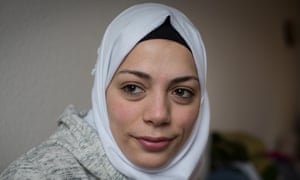
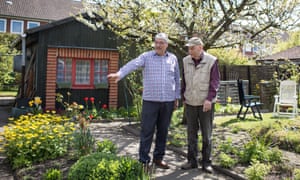
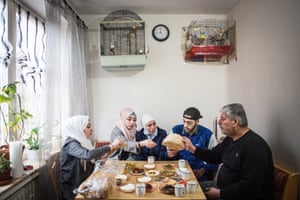
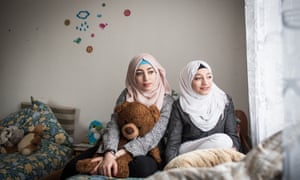
No comments:
Post a Comment